As we navigate through a digital transformation era, the impact and utility of Non-Fungible Tokens (NFTs) and digital assets are broadening their horizons, reaching sectors previously untouched by this technology. The accreditation industry, a critical component of professional and educational validation, stands on the brink of a technological renaissance.
This article delves into how NFTs and blockchain technology are not only enhancing traditional processes but also introducing innovative methods for verifying qualifications and professional achievements.
Revolutionising Professional Verification
At the forefront of this technological revolution is ApdA (The Association for Professionals in Digital Assets). Our approach, utilising NFTs for verifying professionalism, demonstrates how blockchain technology can offer more than digital art and currency.
Our Digital Membership Cards are a prime example – issued as non-transferable, Soul-Bound Tokens upon completing our induction course, they represent a new era of professional accreditation. These tokens are more than digital badges; they are a blockchain-verified testament to a member’s expertise and adherence to our professional standards.
The broader industry, including sectors like education and employment, is also embracing this shift. Governments are beginning to explore blockchain's potential, with countries like Estonia leading the way in integrating blockchain technology into public services. This global shift hints at a future where blockchain technology is a standard in government operations, enhancing transparency and efficiency.
Blockchain Transformations in Various Sectors
Blockchain technology is on the brink of revolutionising accreditation with organisations utilising on-chain to replace traditional digital methods. Healthcare gives a prime example, securing and streamlining patient data and staff qualifications; it could aid in delivering more accurate and efficient healthcare services under accreditation schemes.
The food industry is one step further, employing blockchain for enhanced supply chain transparency, from farm to fork. This technology aids in implementing globally recognized standards, improving product recalls and satisfying consumer demands for transparency and traceability. MakingCoffee.com is one organisation doing just that with their soon to be released coffee brand.
Transforming Educational Credentials
The educational sector is beginning to embrace blockchain, with institutions like Maryville University implementing blockchain for transcripts and diplomas, offering students ownership of their academic credentials. This move towards digital diplomas showcases blockchain's potential in education, streamlining the verification process and saving time and resources for institutions.
In record-keeping, blockchain can significantly reduce overhead associated with verifying academic credentials, making transfers between schools or sharing records with employers more efficiently. Additionally, blockchain's role in supporting lifelong learning is becoming increasingly crucial, as it allows for borderless education and continuous skill development.
Skillset Validation and Career Progression
The employment sector is also seeing innovative use of blockchain for skillset validation, as evidenced by platforms like Seekr.io. These systems not only streamline the recruitment process but also offer transparency in career progression. The integration of blockchain in validating skills and achievements is creating more dynamic and efficient job markets, where talent and achievements are easily identifiable and verifiable.
Environmental Monitoring and Trading.
Blockchain aids in environmental monitoring and emissions performance management. It can be used for accurate, secure, and transparent transactions under accredited emissions trading schemes, improving audits and data collaboration in sustainability standards systems.
Need for Industry Collaboration and government involvement
The adoption of blockchain technology across industries highlights the necessity for collaboration and standardization. This is especially important to address challenges like regulatory uncertainty, reliability, and interoperability between blockchains.
Institutions like UKAS are adopting blockchain in their processes, such as issuing e-Certificates for easy verification of accredited certification. This demonstrates how governments and regulatory bodies can use blockchain to enhance accreditation processes.
Conclusion
The integration of NFTs and digital assets in accreditation is more than just a technological leap; it represents a stride towards a transparent, efficient, and trustworthy environment for professional and educational validation. This evolution in accreditation is a significant step in acknowledging and validating achievements and competencies in the digital age.
Join us at ApdA in embracing this transformative journey. Explore the potential of these technologies and be part of a revolution that is setting new standards in the digital world.
Find out more at www.apda.io.
